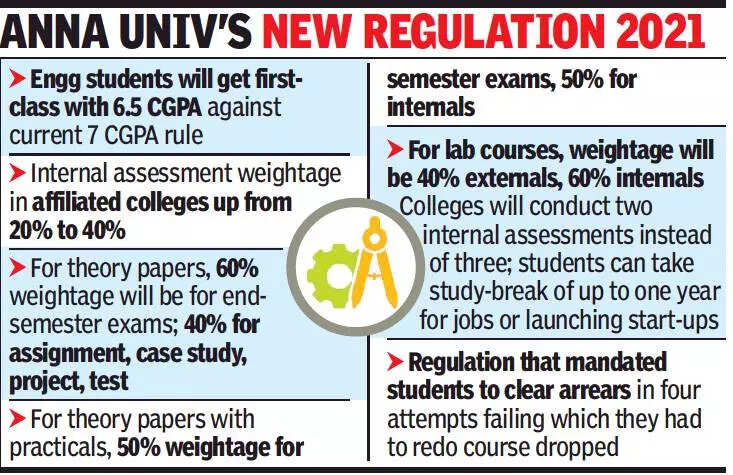Top Searches
- News
- City News
- chennai News
- TN: Weightage for internal marks in engineering up from 20% to 40%
TN: Weightage for internal marks in engineering up from 20% to 40%
TN: Weightage for internal marks in engineering up from 20% to 40%

Representative image
CHENNAI: For students of affiliated colleges of Anna University stuttering at 60% overall fail rate, here is some good news. The university’s new regulation for 2021 has doubled the internal assessment weightage for awarding marks from 20% to 40%.

The cumulative grade point average (CGPA) for getting first class has also been brought down from 7 CGPA to 6.5 CGPA. Just 25% of engineering students cleared all the subjects in the first semester in January 2019, shows data.
The new regulation also allows students to take a study break for up to a year for job or entrepreneurship and has scrapped a 2017 rule that mandated students to compulsorily complete arrears in four attempts. Students can also do up to two online courses in a semester against one course under current rule.
“Earlier, study break was allowed only on medical grounds,” an official said. The new changes were part of the university’s plan to impart uniformity in engineering education offered at affiliated colleges, autonomous colleges, and university departments. While affiliated colleges follow an 80%:20% weightage system for end-semester exams and internal tests, autonomous colleges and university departments follow 60%:40% and 50%: 50% weightage system.
As per the new regulation, theory courses with laboratory components will have 50%:50% weightage for end-semester exams and internal assessment. For laboratory courses, it will be 60% weightage for internal assessment in end-semester exams.
The number of internal assessments has also been brought down from three to two per semester. “There will be two internal assessments in each semester and each assessment will be conducted for 100 marks. An individual assignment or case study or seminar or mini project will carry 40 marks while a written test will be conducted for 60 marks. The candidate’s score for 200 marks will be converted to 40 marks,” the regulations said. End-semester exams will be conducted for 100 marks and the score will be converted into 60 marks.
Anna University vice-chancellor R Velraj said, “The university wanted to bring uniformity among all engineering colleges. The new regulations will give more flexibility to students.”
As per the earlier regulation, students must complete arrears in four attempts, else they may have to redo the course in fifth semester. “Engineering colleges said students with arrears were discontinuing courses and joining deemed universities. So, the regulation was dropped,” V-C said.
The university has also allowed students to appear for arrear exams in subsequent semesters. As per the existing rule, a student can clear arrears from an odd semester only in the next odd semester when the course is offered again. “If a student couldn’t clear in three attempts, then the minimum 50% marks in end-semester exam alone can be declared pass,” the new regulations said.
P Deiva Sundari, principal, KCG College of Technology, said, “The increase in weightage for internal assessment including assignment and case studies, mini projects will help students to get more active learning. It has given more space for outcome-based education.”
“Pass mark for end-semester exam has been retained at 45 to ensure that there is no dilution of standards in evaluating students,” she added.
The university also introduced a new grade “C”. “Students who clear the exam with 50 marks will get C grade,” an official from the university said.
The university has also included science club, literary club and fine arts club apart from NCC and NSS to inculcate scientific temper among students. “All colleges are encouraged to start these clubs. Students are encouraged to participate in any of these clubs as part of extra-curricular activities,” the official added.
The new regulations also introduce project work in the pre-final semester for engineering students.
Some professors, however, said the university needs to evolve a proper mechanism to monitor affiliated colleges to see that they award marks in internal assessment based on impartial evaluation.
“If we apply relative grading for thousands of students in a subject, it won’t make much of a difference,” B Chidambararajan, principal, SRM Valliammai Engineering College, said.

The cumulative grade point average (CGPA) for getting first class has also been brought down from 7 CGPA to 6.5 CGPA. Just 25% of engineering students cleared all the subjects in the first semester in January 2019, shows data.
The new regulation also allows students to take a study break for up to a year for job or entrepreneurship and has scrapped a 2017 rule that mandated students to compulsorily complete arrears in four attempts. Students can also do up to two online courses in a semester against one course under current rule.
“Earlier, study break was allowed only on medical grounds,” an official said. The new changes were part of the university’s plan to impart uniformity in engineering education offered at affiliated colleges, autonomous colleges, and university departments. While affiliated colleges follow an 80%:20% weightage system for end-semester exams and internal tests, autonomous colleges and university departments follow 60%:40% and 50%: 50% weightage system.
As per the new regulation, theory courses with laboratory components will have 50%:50% weightage for end-semester exams and internal assessment. For laboratory courses, it will be 60% weightage for internal assessment in end-semester exams.
The number of internal assessments has also been brought down from three to two per semester. “There will be two internal assessments in each semester and each assessment will be conducted for 100 marks. An individual assignment or case study or seminar or mini project will carry 40 marks while a written test will be conducted for 60 marks. The candidate’s score for 200 marks will be converted to 40 marks,” the regulations said. End-semester exams will be conducted for 100 marks and the score will be converted into 60 marks.
Anna University vice-chancellor R Velraj said, “The university wanted to bring uniformity among all engineering colleges. The new regulations will give more flexibility to students.”
As per the earlier regulation, students must complete arrears in four attempts, else they may have to redo the course in fifth semester. “Engineering colleges said students with arrears were discontinuing courses and joining deemed universities. So, the regulation was dropped,” V-C said.
The university has also allowed students to appear for arrear exams in subsequent semesters. As per the existing rule, a student can clear arrears from an odd semester only in the next odd semester when the course is offered again. “If a student couldn’t clear in three attempts, then the minimum 50% marks in end-semester exam alone can be declared pass,” the new regulations said.
P Deiva Sundari, principal, KCG College of Technology, said, “The increase in weightage for internal assessment including assignment and case studies, mini projects will help students to get more active learning. It has given more space for outcome-based education.”
“Pass mark for end-semester exam has been retained at 45 to ensure that there is no dilution of standards in evaluating students,” she added.
The university also introduced a new grade “C”. “Students who clear the exam with 50 marks will get C grade,” an official from the university said.
The university has also included science club, literary club and fine arts club apart from NCC and NSS to inculcate scientific temper among students. “All colleges are encouraged to start these clubs. Students are encouraged to participate in any of these clubs as part of extra-curricular activities,” the official added.
The new regulations also introduce project work in the pre-final semester for engineering students.
Some professors, however, said the university needs to evolve a proper mechanism to monitor affiliated colleges to see that they award marks in internal assessment based on impartial evaluation.
“If we apply relative grading for thousands of students in a subject, it won’t make much of a difference,” B Chidambararajan, principal, SRM Valliammai Engineering College, said.
FacebookTwitterLinkedinEMail
Start a Conversation
end of article

